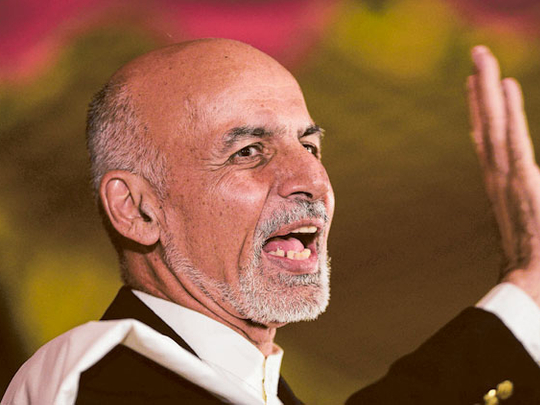
Born in 1949 into an influential family, Ashraf Gani grew up in Afghanistan before leaving the country to be educated abroad. He carved out a respected international career during decades in exile, gaining a PhD in anthropology from Columbia University in the US before joining the World Bank.
He also spent time in Lebanon, where he met his wife.
Widely seen as a technocrat and an academic, Gani served as a special adviser to the UN’s envoy to Afghanistan following the US-led invasion.
His overseas diplomatic credentials are impeccable — at the end of 2006 he was tipped as a possible successor to Kofi Annan as UN secretary-general.
Gani served as Afghanistan’s finance minister between 2002 and 2004, spearheading the country’s attempted economic recovery after the overthrow of the Taliban.
An ethnic Pashtun from the influential Ahmadzai tribe, Gani went on to become chancellor of Kabul University in 2005 and a senior adviser to President Hamid Karzai in 2011.
He has played an instrumental role in negotiations with the US and Nato over how Afghanistan will be governed once foreign troops withdraw later this year.
Gani has, right through the presidential election campaign, argued that the vote should be as fair and transparent as possible. “As a candidate I don’t want a single fraudulent vote in my favour and call on other candidates to denounce fraud, not encourage it,” he wrote on Twitter.
His appointment as economic adviser in Hamid Karzai’s interim government immediately after the Taliban’s fall in 2001 meant that he oversaw reconstruction and foreign aid. But after the 2004 presidential election, he declined to join Karzai’s government, asking instead to be appointed as chancellor of Kabul University.
Gani argues that he is the candidate best placed to alleviate the plight of Afghanistan’s poor.
Gani also made a bid for power in the 2009 presidential poll — giving up his US citizenship in order to do so — but ended up only winning about 3 per cent of the vote.
Some argue that his time spent abroad means that he has not had sufficient time to build up a power base in Afghanistan, but the number of votes he won in April appears to contradict this view.
Alleviating the plight of Afghanistan’s rural poor has been a focus of his campaign.
“They know my voice,” Gani said of the country’s voters. “The only person who has addressed the issues of rural Afghanistan has been me. You put me in front of any rural village in Afghanistan and see who connects to whom.”
Gani argues that this ability is matched by his determination to work for the poor in the corridors of power.
He was instrumental in setting up in 2006 the Institute for State Effectiveness, which has put forward 10 key functions that it says a government must perform in order to serve its citizens more effectively.
—Compiled from agencies












